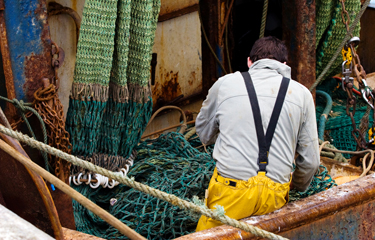A scheme introduced by Irish authorities in 2016 for migrant fishing workers has not worked and the country is turning a blind eye to abuses in the sector, according to Michael O’Brien, fisheries campaign lead at the International Transport Workers Federation’s Dublin office.
The Atypical Work Permit (ATS) scheme is being abused by trawler owners, O’Brien said, citing recently released data from the state-funded Workplace Relations Commission (WRC) that found 323 contraventions of ATS regulations during 454 inspections of Irish trawlers since February 2016. Of the 43 contraventions in the 12 months to 31 May, 2021, the most-cited contravention by the WRC inspectors was the failure to grant annual leave and public holiday entitlements.
Only 227 of the 500 permits under the ATS scheme – which applies to workers from outside the European Economic Area (E.U. and nations like Iceland and Norway) – have thus far been allotted as of June 2021, according to Ireland’s Department of Agriculture said. Of those 227 permits, 111 were to Filipino nationals, with 48 granted to workers from Egypt, and 28 each to nationals of Ghana and Indonesia. The Irish Department of Agriculture said the permits had been issued to 93 vessels with 68 different owners. Previous estimates have put the number of foreign workers in the Irish fleet at more than 2,000.
“This begs the question: How are vessels being crewed?” O’Brien said.
Gerald "Ged" Nash, a former senator in the upper house of Ireland’s parliament and minister for business and employment - who helped create the ATS - said in a 2017 SeafoodSource interview that many foreign fishermen working in Ireland are not properly treated, with many being hired illegally outside of the ATS.
Before bringing a non-EEA fishing worker to Ireland, the Irish employer must engage a solicitor to draft a 12-month contract guaranteeing at least the Irish minimum wage, health insurance, and the costs of returning home when employment is terminated. But echoing Nash's findings, O’Brien said workers on the ATS scheme are averaging 100 hours a week, despite a national average 39-hour week.
O’Brien said he has spoken to 30 undocumented workers who have left the trawlers due to alleged abuse and are now surviving in Ireland on “odd jobs.”
In 2017, the ITF, O'Brien's organization, went to the Irish High Court to suspend the scheme until it was enforceable. Judges there ordered a period of mediation process between the ITF and the state, which ran until April 2019. With that period now over, O’Brien said ITF will continue its campaign against alleged transgressions of the scheme’s stipulations.
But Norah Parke, the project coordinator of the Killybegs Fishermen’s Organisation, which represents fishing firms operating out of the country’s busiest fishing port, said there was another potential reason for the low take-up of ATS permits. Describing a recent three-month process in securing a visa for a Filipino worker, Parke described to SeafoodSource a “cumbersome” mechanism run through an “inter-departmental system that doesn’t work.”
Irish fishing firms engaging with labor agencies in countries like the Philippines worry that the worker may choose other employment in the time it takes for the application to be processed, Parke said. While stressing that her demersal-focused members’ vessels are able to source labor locally, Parke said she wants to see the process sped up, but also wants migrant fishermen to be classed as skilled rather than non-skilled workers, as is currently the case. The fact that the system is run by four Irish state departments makes it harder for reforms to be made quickly, according to Parke, who noted that a comparable permit system run by the U.K. is a “far more efficient” by comparison.
John Ward, the CEO of the Irish Fish Producers Organisation, a trade group representing commercial fishing vessel-owners, likens the situation of foreign workers on Irish vessels to that of Irish working without proper papers in the U.S.
“There is no doubt that there were illegal immigrants employed on Irish fishing vessels, in the same way as there are many Irish illegals in the U.S.A.,” Ward said. “Our government has always been trying to regularize this situation for our nationals and lately fishing organizations in Ireland are asking our government to do the same for people on the Atypical Scheme working in Ireland. Greens cards for all.”
Ward told SeafoodSource the scheme “has solved many of the preexisting issues.”
“That is not to say that there have not been difficulties between employees and owners – always in these cases there are accusations of forced labor and abuse. All accusations are fair in love and war and everyone wants to make the strongest case. The truth never gets in the way of a good story,” Ward said. “Nobody likes the Atypical Scheme because it is a bureaucratic nightmare drawn up by civil servants and we as industry cannot change it. Once the employee’s contract is up, they have to go home until the contract is renewed. With COVID-19, this may mean isolation or quarantine for a period at home, followed by the same on return, notwithstanding if they are even allowed to return if they are coming from a particular country.”
The Irish fishing industry will need more foreign workers in the long term, Ward said.
“Some of the people came here as illegals and are now on the Atypical Scheme. We want them to be allowed to stay in Ireland if that is what they wish,” Ward said. “Recently, as part of a wider fishery protest, we had two Asian fishermen asking the Irish government to help them as they do for Irish workers in America. There is no doubt the fishing industry needs and values these people, as young Irish people are reluctant to take these job opportunities.”
Photo courtesy of Ivica Drusany/Shutterstock







